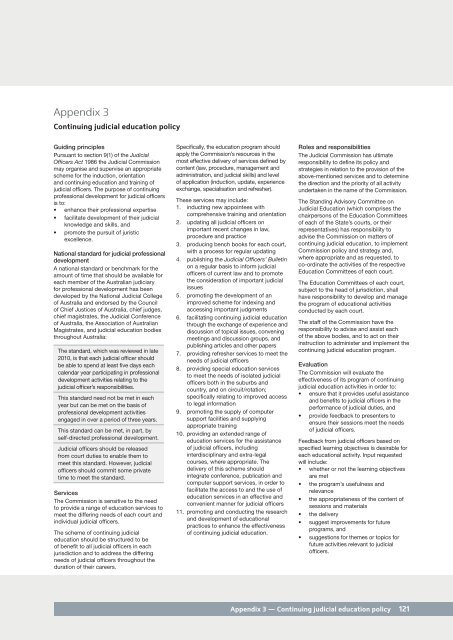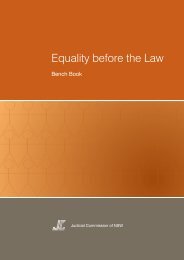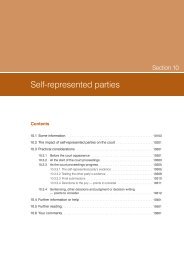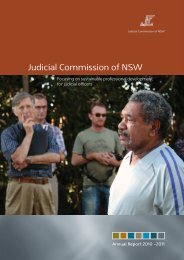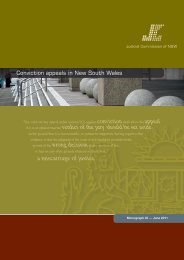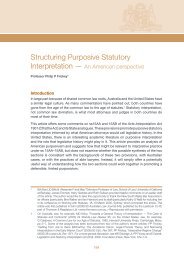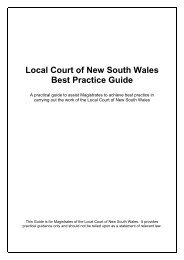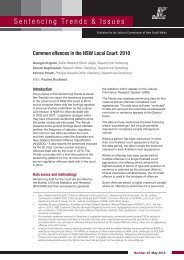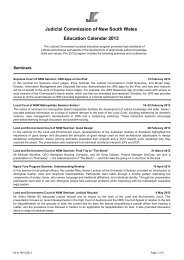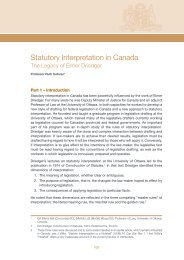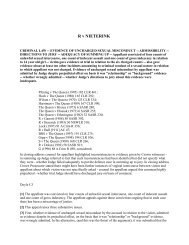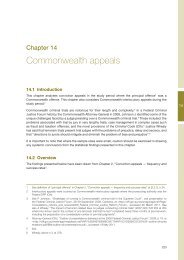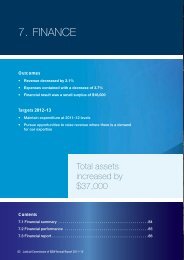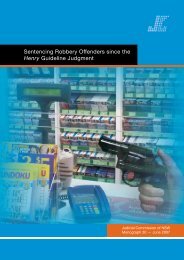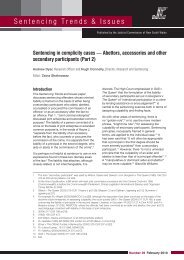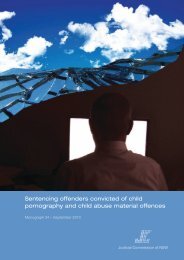Download - Judicial Commission of New South Wales - NSW ...
Download - Judicial Commission of New South Wales - NSW ...
Download - Judicial Commission of New South Wales - NSW ...
You also want an ePaper? Increase the reach of your titles
YUMPU automatically turns print PDFs into web optimized ePapers that Google loves.
Appendix 3<br />
Continuing judicial education policy<br />
Guiding principles<br />
Pursuant to section 9(1) <strong>of</strong> the <strong>Judicial</strong><br />
Officers Act 1986 the <strong>Judicial</strong> <strong>Commission</strong><br />
may organise and supervise an appropriate<br />
scheme for the induction, orientation<br />
and continuing education and training <strong>of</strong><br />
judicial <strong>of</strong>ficers. The purpose <strong>of</strong> continuing<br />
pr<strong>of</strong>essional development for judicial <strong>of</strong>ficers<br />
is to:<br />
• enhance their pr<strong>of</strong>essional expertise<br />
• facilitate development <strong>of</strong> their judicial<br />
knowledge and skills, and<br />
• promote the pursuit <strong>of</strong> juristic<br />
excellence.<br />
National standard for judicial pr<strong>of</strong>essional<br />
development<br />
A national standard or benchmark for the<br />
amount <strong>of</strong> time that should be available for<br />
each member <strong>of</strong> the Australian judiciary<br />
for pr<strong>of</strong>essional development has been<br />
developed by the National <strong>Judicial</strong> College<br />
<strong>of</strong> Australia and endorsed by the Council<br />
<strong>of</strong> Chief Justices <strong>of</strong> Australia, chief judges,<br />
chief magistrates, the <strong>Judicial</strong> Conference<br />
<strong>of</strong> Australia, the Association <strong>of</strong> Australian<br />
Magistrates, and judicial education bodies<br />
throughout Australia:<br />
The standard, which was reviewed in late<br />
2010, is that each judicial <strong>of</strong>ficer should<br />
be able to spend at least five days each<br />
calendar year participating in pr<strong>of</strong>essional<br />
development activities relating to the<br />
judicial <strong>of</strong>ficer’s responsibilities.<br />
This standard need not be met in each<br />
year but can be met on the basis <strong>of</strong><br />
pr<strong>of</strong>essional development activities<br />
engaged in over a period <strong>of</strong> three years.<br />
This standard can be met, in part, by<br />
self-directed pr<strong>of</strong>essional development.<br />
<strong>Judicial</strong> <strong>of</strong>ficers should be released<br />
from court duties to enable them to<br />
meet this standard. However, judicial<br />
<strong>of</strong>ficers should commit some private<br />
time to meet the standard.<br />
Services<br />
The <strong>Commission</strong> is sensitive to the need<br />
to provide a range <strong>of</strong> education services to<br />
meet the differing needs <strong>of</strong> each court and<br />
individual judicial <strong>of</strong>ficers.<br />
The scheme <strong>of</strong> continuing judicial<br />
education should be structured to be<br />
<strong>of</strong> benefit to all judicial <strong>of</strong>ficers in each<br />
jurisdiction and to address the differing<br />
needs <strong>of</strong> judicial <strong>of</strong>ficers throughout the<br />
duration <strong>of</strong> their careers.<br />
Specifically, the education program should<br />
apply the <strong>Commission</strong>’s resources in the<br />
most effective delivery <strong>of</strong> services defined by<br />
content (law, procedure, management and<br />
administration, and judicial skills) and level<br />
<strong>of</strong> application (induction, update, experience<br />
exchange, specialisation and refresher).<br />
These services may include:<br />
1. inducting new appointees with<br />
comprehensive training and orientation<br />
2. updating all judicial <strong>of</strong>ficers on<br />
important recent changes in law,<br />
procedure and practice<br />
3. producing bench books for each court,<br />
with a process for regular updating<br />
4. publishing the <strong>Judicial</strong> Officers’ Bulletin<br />
on a regular basis to inform judicial<br />
<strong>of</strong>ficers <strong>of</strong> current law and to promote<br />
the consideration <strong>of</strong> important judicial<br />
issues<br />
5. promoting the development <strong>of</strong> an<br />
improved scheme for indexing and<br />
accessing important judgments<br />
6. facilitating continuing judicial education<br />
through the exchange <strong>of</strong> experience and<br />
discussion <strong>of</strong> topical issues, convening<br />
meetings and discussion groups, and<br />
publishing articles and other papers<br />
7. providing refresher services to meet the<br />
needs <strong>of</strong> judicial <strong>of</strong>ficers<br />
8. providing special education services<br />
to meet the needs <strong>of</strong> isolated judicial<br />
<strong>of</strong>ficers both in the suburbs and<br />
country, and on circuit/rotation;<br />
specifically relating to improved access<br />
to legal information<br />
9. promoting the supply <strong>of</strong> computer<br />
support facilities and supplying<br />
appropriate training<br />
10. providing an extended range <strong>of</strong><br />
education services for the assistance<br />
<strong>of</strong> judicial <strong>of</strong>ficers, including<br />
interdisciplinary and extra-legal<br />
courses, where appropriate. The<br />
delivery <strong>of</strong> this scheme should<br />
integrate conference, publication and<br />
computer support services, in order to<br />
facilitate the access to and the use <strong>of</strong><br />
education services in an effective and<br />
convenient manner for judicial <strong>of</strong>ficers<br />
11. promoting and conducting the research<br />
and development <strong>of</strong> educational<br />
practices to enhance the effectiveness<br />
<strong>of</strong> continuing judicial education.<br />
Roles and responsibilities<br />
The <strong>Judicial</strong> <strong>Commission</strong> has ultimate<br />
responsibility to define its policy and<br />
strategies in relation to the provision <strong>of</strong> the<br />
above-mentioned services and to determine<br />
the direction and the priority <strong>of</strong> all activity<br />
undertaken in the name <strong>of</strong> the <strong>Commission</strong>.<br />
The Standing Advisory Committee on<br />
<strong>Judicial</strong> Education (which comprises the<br />
chairpersons <strong>of</strong> the Education Committees<br />
<strong>of</strong> each <strong>of</strong> the State’s courts, or their<br />
representatives) has responsibility to<br />
advise the <strong>Commission</strong> on matters <strong>of</strong><br />
continuing judicial education, to implement<br />
<strong>Commission</strong> policy and strategy and,<br />
where appropriate and as requested, to<br />
co-ordinate the activities <strong>of</strong> the respective<br />
Education Committees <strong>of</strong> each court.<br />
The Education Committees <strong>of</strong> each court,<br />
subject to the head <strong>of</strong> jurisdiction, shall<br />
have responsibility to develop and manage<br />
the program <strong>of</strong> educational activities<br />
conducted by each court.<br />
The staff <strong>of</strong> the <strong>Commission</strong> have the<br />
responsibility to advise and assist each<br />
<strong>of</strong> the above bodies, and to act on their<br />
instruction to administer and implement the<br />
continuing judicial education program.<br />
Evaluation<br />
The <strong>Commission</strong> will evaluate the<br />
effectiveness <strong>of</strong> its program <strong>of</strong> continuing<br />
judicial education activities in order to:<br />
• ensure that it provides useful assistance<br />
and benefits to judicial <strong>of</strong>ficers in the<br />
performance <strong>of</strong> judicial duties, and<br />
• provide feedback to presenters to<br />
ensure their sessions meet the needs<br />
<strong>of</strong> judicial <strong>of</strong>ficers.<br />
Feedback from judicial <strong>of</strong>ficers based on<br />
specified learning objectives is desirable for<br />
each educational activity. Input requested<br />
will include:<br />
• whether or not the learning objectives<br />
are met<br />
• the program’s usefulness and<br />
relevance<br />
• the appropriateness <strong>of</strong> the content <strong>of</strong><br />
sessions and materials<br />
• the delivery<br />
• suggest improvements for future<br />
programs, and<br />
• suggestions for themes or topics for<br />
future activities relevant to judicial<br />
<strong>of</strong>ficers.<br />
Appendix 3 — Continuing judicial education policy 121


